
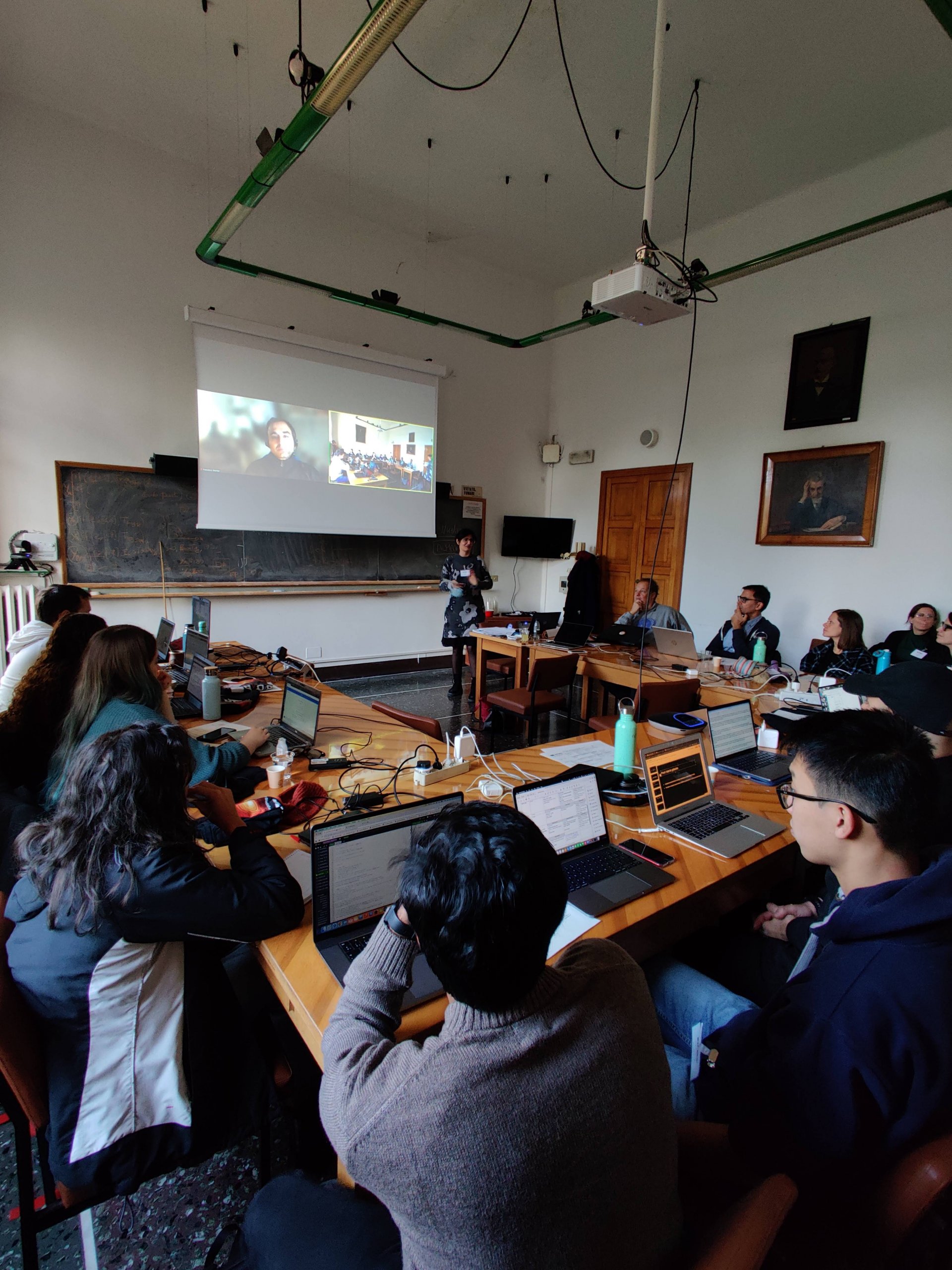
On a beautiful mild sunny morning our second in-person network training event got underway with a warm welcome from our consortium host PI, Prof. Marcella Brusa, Dipartimento di Fisica e Astronomia, Alma Mater Studiorum Universita di Bologna, Italy, and the Bi4BESt Project coordinator, Prof. Francesco Shankar, Physics & Astronomy Department, Faculty of Engineering and Physical Sciences, University of Southampton, UK. All the Early-Stage Researchers (ESRs) attended in person together with most of the consortium’s Principal Investigators. Other PIs unable to attend in person join remotely. Our attendees came from Italy, Spain, Canary Islands, Greece, UK, and Germany, so a global partnership and a wonderful collaborative event.
Participants
Early-Stage Researchers
Carolina Andonie (UDUR), Brivael Laloux (NOA), Blessing Musiimenta (UNIBO), Giovanna Speranza (IAC), Mathilda Avirett-MacKenzie (UBATH), Ivan Munoz Rodriguez (NOA), Ivan Lopez (UNIBO), Nischal Acharya (DIPC), Alexander Sicilia (SISSA), Evgenii Chaikin (ULEI), Alba Vega Alonso Tetilla (SOTON), Hao Fu (SOTON), Luca Sala (LMU)
Principle Investigators
Prof. Francesco Shankar, Project Coordinator, University of Southampton, UK (SOTON), Prof. Marcella Brusa, Alma Mater Studiorum Universita di Bologna, Italy (UNIBO), Dr Antonis Georgakakis, Institute for Astronomy, Astrophysics, Space Applications and Remote Sensing, National Observatory of Athens, Greece (NOA), Dr Klaus Dolag, Ludwig Maximilians University, Germany (LMU), Prof. Andrea Lapi – Scuola Internazionale Superiore di Studi Avanzati, Italy (SISSA), Dr Carolin Villforth University of Bath, UK (UBATH), Dr Silvia Bonoli – Donostia International Physics Centre, Spain, (DIPC), Dr Cristina Ramos Almeida, Instituto de Astrofisica de Canarias, Spain (IAC), Prof. David Alexander, University of Durham, UK (UDUR), Prof. Joop Schaye, Leiden Observatory, The Netherlands (ULEI)
Day 1 & 2: commenced with Work Package meetings 1, 2, 3 & 4 where ESRs shared their research and results in response to their Work Package objectives. These sessions included lively discussions and thought-provoking ideas and strategies.
Day 2: We were delighted to welcome three prominent Bologna academics (Andrea Comastri – Director of Astrophysics and Space Science Observatory in Bologna (part of INAF National Institute for Astrophysics), Dr. Carlotta Gruppioni – Senior Staff Researcher, National Institute of Astrophysics Observatory (OAS), Bologna and Dr. Roberto Gilli – Senior Researcher (Primo Ricercatore), INAF-OAS Bologna), to engage with PIs and ESRs in the Brain Storming sessions with discussions centred around the overarching, broader and general scope to Black Holes.
In the evening the group were treated to a delicious social dinner at the ‘Cantina Bentivoglio’ restaurant. A lovely way to relax after a very busy day!
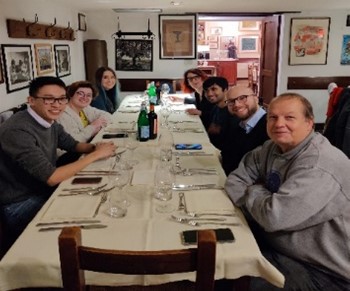
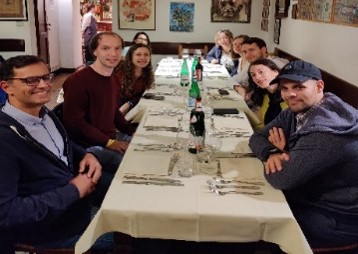
Day 3: We held an election to vote in a new ESR representative. Nischal Acharya will be taking up the mantel of this important role within the consortium in early December. Duties include meeting regularly with ESRs, attending and representing the ESRs feedback, and playing an active role at the Supervisory Board convened every two months. We thank the outgoing Rep, Alba Vega Alonso Tetilla, who has done an amazing job in this role this past year.
The ESRs moved onto the pastoral meeting with the Project Manager followed by the ESR Forum – self organised and independent.
The scheduled also allowed time and space for PIs to engage together in worthwhile ‘status of the project’ discussions.
In the afternoon we were pleased to have the BiD4BESt Project Coordinator, Prof. Francesco Shankar, Southampton, UK, deliver an excellent lecture on ‘Tips on how to write your first (or second or third) scientific paper’ via Zoom, which was opened to the wider Bologna academic/student community. The general aim of the lecture was to provide some general, useful tips to improve one’s writing skills and guidance for student’s first (or second, third) scientific paper. The speaker guided the audience towards the expected layout, written style, and content that should characterise a professional academic paper. To access the slides please use this link
We were also treated to a very successful Public Talk, “Vita, morte e miracoli dei buchi neri supermassicci” (Life, death, and miracles of supermassive black holes), given by Dr Silvia Bonoli, Donostia International Physics Centre, Spain (DIPC).

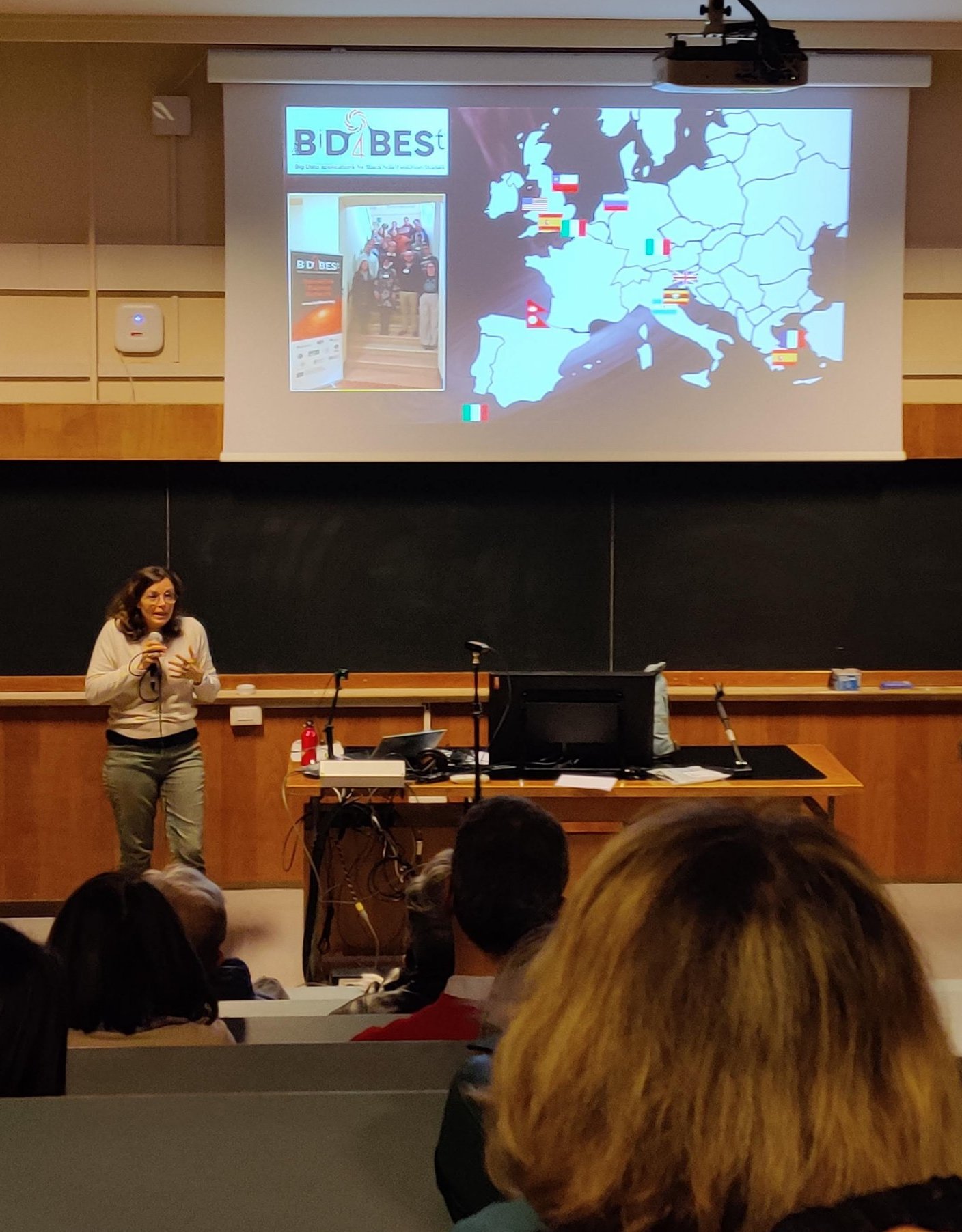
Talks continued at the local Café
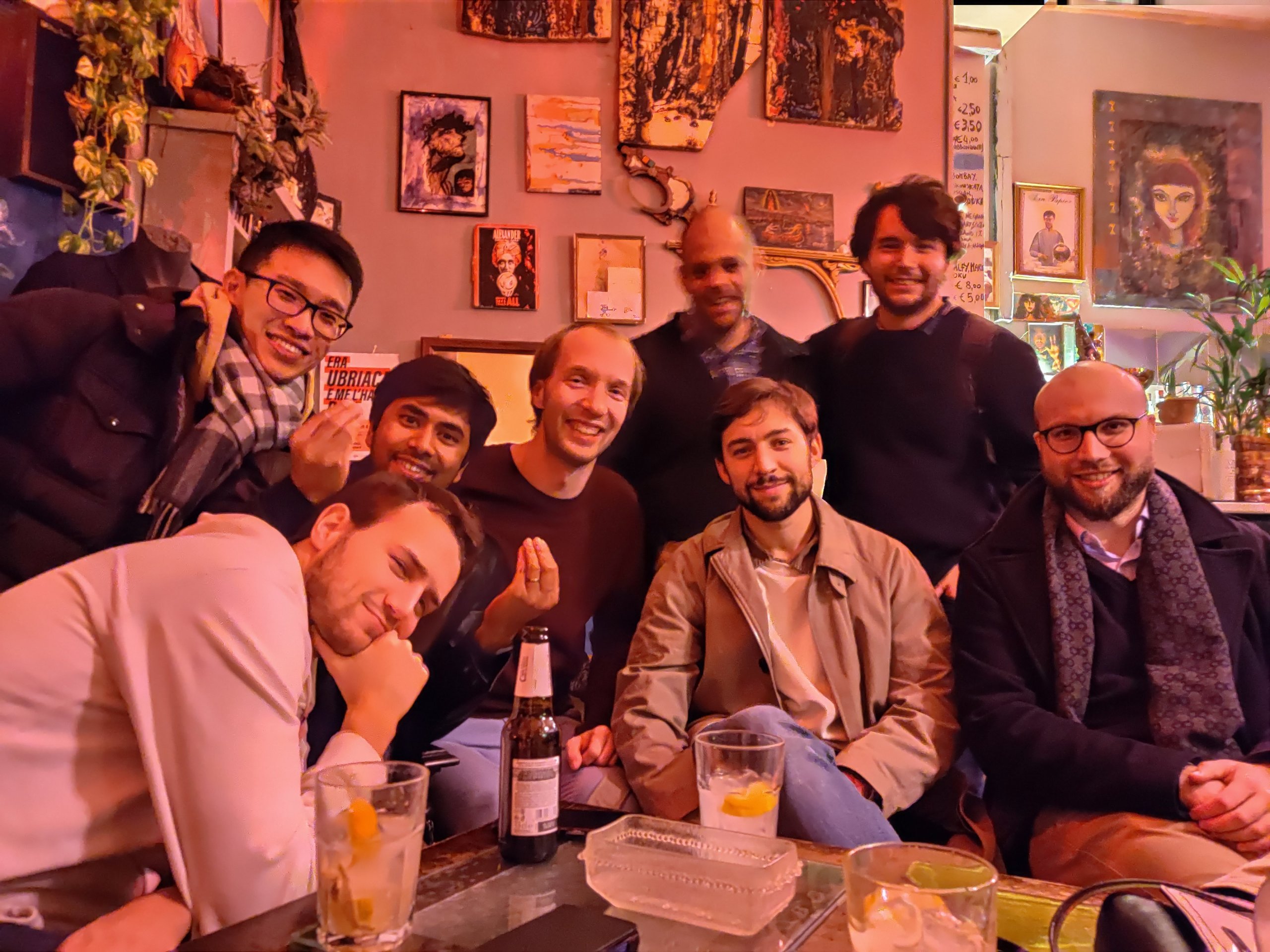
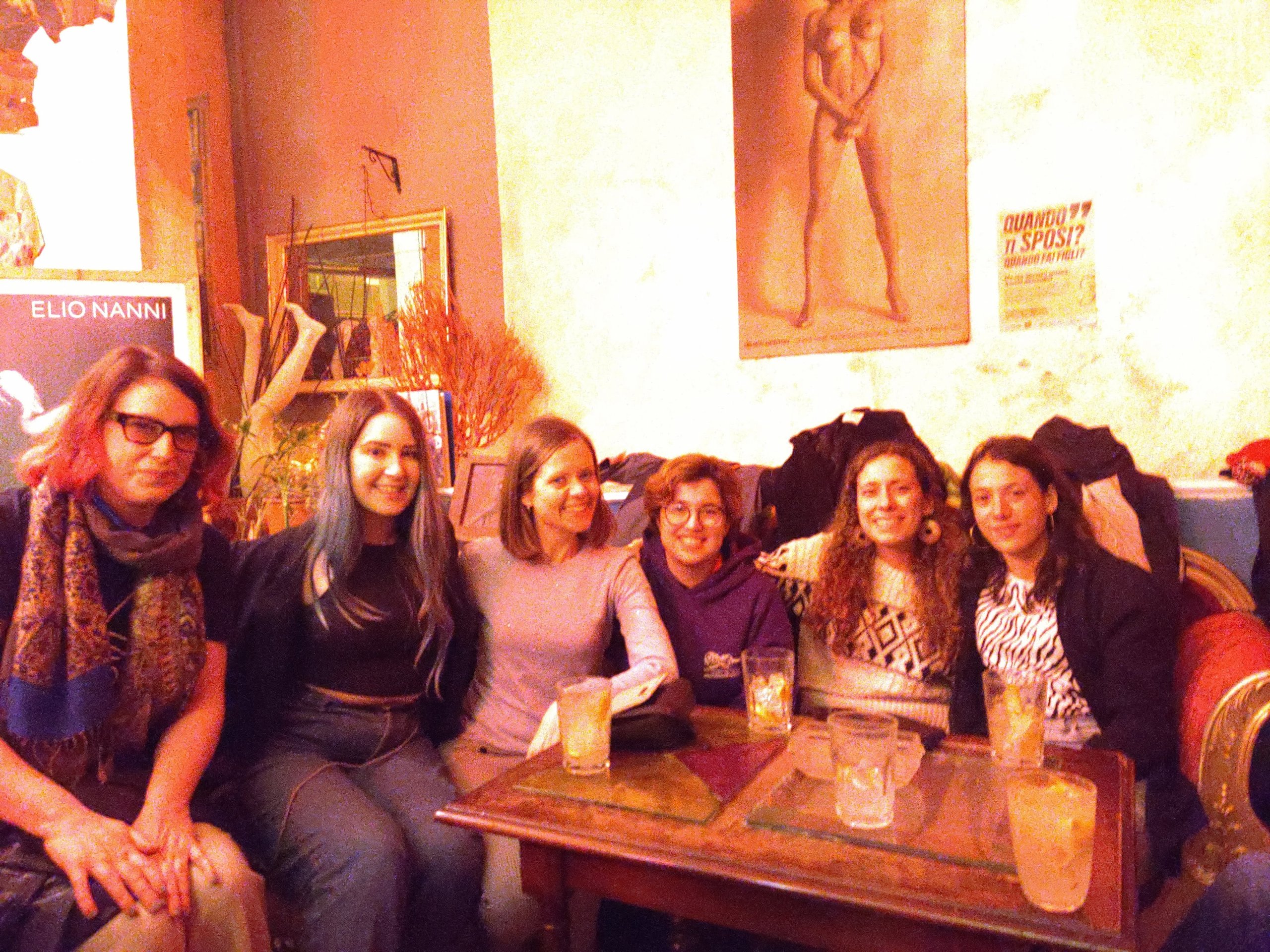
Day 4: For our ESRs the focus was on the Communications Workshop (all day event); hands-on and very interactive sessions.
Trainers were Prof. John Knapen – research professor in astronomy at the Instituto de Astrofísica de Canarias on the Spanish island of Tenerife.
Dr. Diane Black – holds a Ph.D. from the Department of Life Sciences, Purdue University, Indiana, USA. Diane switched her interest increasingly to teaching English language skills and teaches Publishing in English courses to Ph.D. students.
Dr. Nushkia Chamba, a postdoctoral fellow at The Oskar Klein Centre and Department of Astronomy at Stockholm University, who found her passion in writing (and physics) during her undergraduate degree at New York University Abu Dhabi.
These sessions provided a step-by-step, stress-free approach to planning and writing publications. Objectives were to know how to prepare to write a paper, plan it, draft it, edit, and perfect it. In addition, how to avoid some of the most common grammatical errors made by non-anglophones.
Day 5: The final day of the training event included the ESRs attending the weekly Bologna FAME (Friday AGN Meeting) at the Department of Physics and Astronomy. The organisers invited our ESRs to give talks there: Alba Vega Alonso Tetilla (SOTON), introduced the BiD4BESt grant, followed by Ivan Munoz Rodriguez (NOA) and Nischal Acharya (DIPC), who presented their work linking it to the rest of the BiD4BESt cohort. Our thanks go to the FAME’s organisers for the invitation and for organising this event. The rest of the day was used for networking time & time for 1-1’s meetings with Bologna Departmental Scientists / BID4BESt PIs and other outreach activities/collaborations.
The network would like to thank the host, Prof. Marcella Brusa, Dipartimento di Fisica e Astronomia, Alma Mater Studiorum Universita di Bologna for the hard work and organisation that went into making this a successful event.

This project has received funding from the European Union’s Horizon 2020 research and innovation programme under the Marie Skłodowska-Curie grant agreement No 860744

